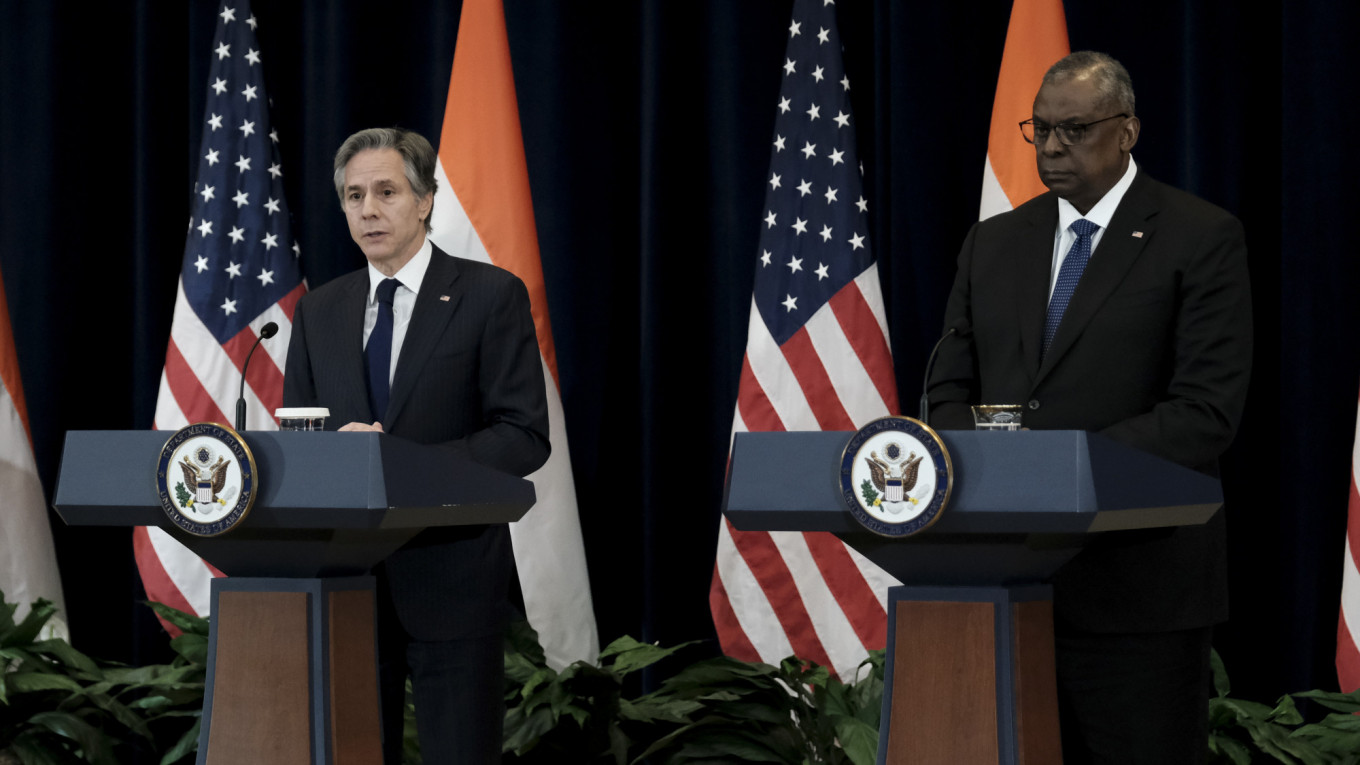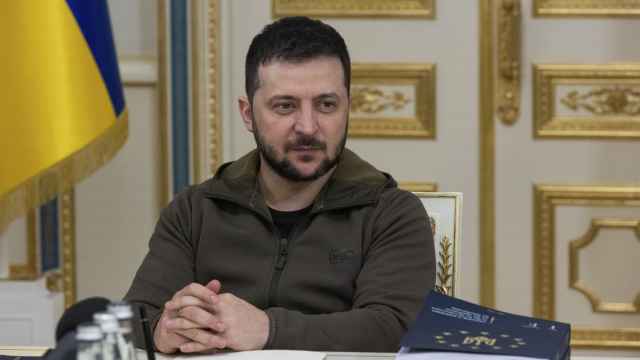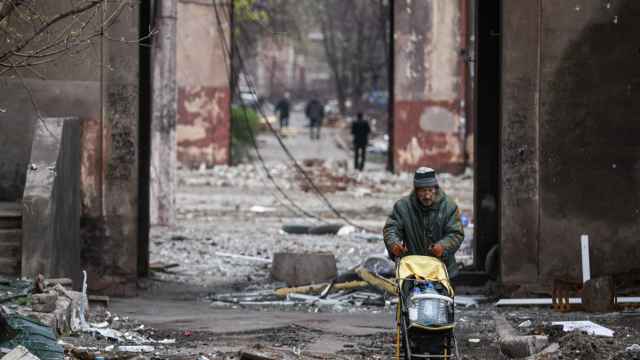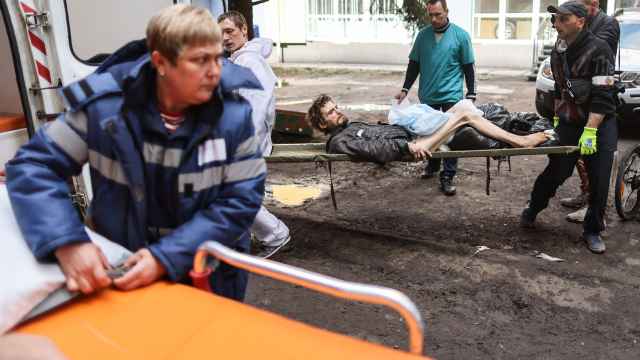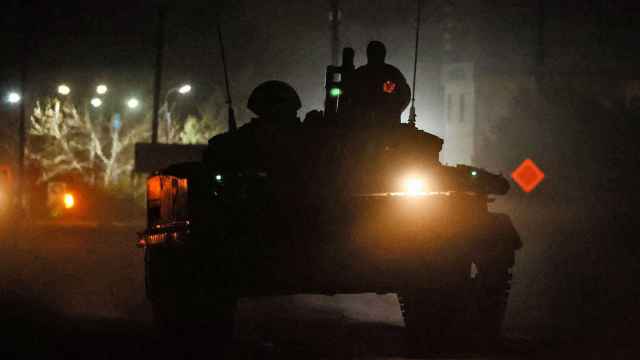The United States' top diplomat and defense chief were in Kyiv on Sunday, Ukraine's presidency said, making the first high-level visit by U.S. officials since Russia invaded its neighbor two months ago, as fierce fighting cast a shadow over Orthodox Easter.
The trip by Secretary of State Antony Blinken and Defense Secretary Lloyd Austin comes as the war enters its third month, with thousands dead and millions displaced, and as Kyiv desperately sought relief for Ukrainians trapped in the battered city of Mariupol.
Presidential adviser Oleksiy Arestovych said Ukrainian leader Volodymyr Zelensky met with the U.S. officials Sunday, as Mariupol's defenses were "already on the brink of collapse" and Ukraine was in dire need of offensive weapons.
"As long as there are no 'offensives,' there will be a new Bucha every day," he said in an interview on a Russian former lawyer's popular YouTube channel, referring to the town where UN officials said they had documented the unlawful killings of around 50 civilians.
"Maybe they can help," Arestovych added of the U.S. envoys. "They wouldn't come here, if they weren't ready to give [weapons]."
While the visit remained unconfirmed by Washington and details were kept under wraps, Zelensky tweeted later Sunday that the "Ukraine-U.S. friendship and partnership are stronger than ever!"
The United States has been a leading donor of finance and weaponry to Ukraine and a key sponsor of sanctions targeting Russia, but had not sent any top officials to Kyiv, while several European leaders had traveled there to underscore their support.
'Fierce hatred'
The highly sensitive trip by two of President Joe Biden's top cabinet members coincided with Easter celebrations in the largely Orthodox country.
"Our souls are filled with fierce hatred for the invaders and all that they have done," Zelensky said in a statement marking the holiday. "Don't let rage destroy us from within."
As Ukrainians marked a somber Easter, with many braving bombardment for blessings, Russian forces showed no sign of easing their attacks.
Five civilians were killed and another five wounded in Donetsk on Sunday, the besieged eastern region's Governor Pavlo Kyrylenko said. Authorities also reported a death in northeastern Kharkiv.
The day before, a missile strike on the southern city of Odessa left eight dead and at least 18 wounded, according to Zelensky, who said five missiles hit the historic city.
"Among those killed was a three-month-old baby girl," Zelensky said. "How did she threaten Russia? It seems that killing children is just a new national idea of the Russian Federation."
Russia's defense ministry said it had targeted a major depot stocking foreign weapons near Odessa, attacks that upended the relative calm the city has enjoyed since the war began.
Zelensky accused Russia of being a terrorist state, one that has devastated the port city of Mariupol with weeks of unrelenting bombardment.
Yet, with thousands of Ukrainian fighters and civilians in Mariupol facing increasingly dire conditions, Kyiv invited Moscow to talks near the sprawling Azovstal steel plant where Ukrainian fighters are still holding out, Ukraine said Sunday.
"We invited Russians to hold a special round of talks on the spot, right next to the walls of Azovstal," the last Ukrainian stronghold in the strategic port, said Arestovych.
There was no immediate response from Russia. Its president, Vladimir Putin, had ordered his forces not to assault the plant, but Ukrainians say the attacks continue unabated.
'Pause to save lives'
On Sunday, the United Nations' Ukraine crisis coordinator Amin Awad called for an "immediate stop" to fighting in Mariupol to allow trapped civilians to leave.
"The lives of tens of thousands, including women, children and older people, are at stake in Mariupol," Awad said in a statement.
"We need a pause in fighting right now to save lives."
The call came a day after the latest attempt to evacuate civilians from Mariupol failed.
In a message posted on social media Sunday, Sviatoslav Palamar — deputy commander of the far-right Azov Regiment, which is sheltering in a warren of tunnels under the steel plant — said Russian forces continued to rain down fire on Azovstal.
"The enemy continues air strikes, artillery from the sea... enemy tanks continue to strike and infantry is trying to storm," said Palamar.
Mariupol, which the Kremlin claims to have "liberated," is pivotal to Russia's war plans to forge a land bridge to Russian-occupied Crimea — and possibly beyond, as far as Moldova.
The latest fighting followed an announcement earlier this week from a senior Russian military officer who said Moscow aimed to take full control over the eastern Donbas region and southern Ukraine.
Amid the calls to halt the fighting in Mariupol, the Organization for Security and Cooperation in Europe (OSCE) said it was "extremely concerned" after a number of its Ukrainian members were believed to have been arrested in pro-Russian separatist territories in the country's east.
More than 5 million Ukrainians have fled the country, and millions of others have been displaced internally, officials say.
In the western city of Lviv, 32-year-old Tetiana Kasian — who had fled Mariupol — stopped to solemnly take in a wall of flowers memorialising the dead.
"I never thought that it would happen in Ukraine in the 21st century," she said quietly. "I don't know if I will see my parents" again.
Easter Sunday
Even as fighting raged on, Ukrainians took time to observe a solemn Easter.
Under the rain at a frontline position in the eastern town of Lyman, soldiers traded the usual patriotic salutation of "Glory to Ukraine!" for a cry of "Christ has risen!"
"Truly risen!" came the reply.
Around 50 civilians gathered in the town's small Orthodox church. Artillery fire could be heard as they prayed.
"If we make the wrong choices, then darkness will ruin us, as darkness is destroying us during this war," the priest said in his sermon.
Elsewhere on the frontline, in the eastern city of Severodonetsk, Ukrainian troops had hidden their small stock of supplies, including Easter treats, under a bridge after Russian mortar rounds struck overnight.
Next to the Kalashnikovs were Coke bottles and cereal bars, as well as icing-covered Easter breads sprinkled with colorful sugar beads.
While others have fled the battered country, some Ukrainians have stayed in place — either bound to the land, too old or ill to travel, or simply lacking other options.
"I must work," farmer Vassili Kushch, 63, said in the village of Mala Tokmachka in southern Ukraine, standing near rubble left by a bomb. "I don't have anywhere else to go."
A Message from The Moscow Times:
Dear readers,
We are facing unprecedented challenges. Russia's Prosecutor General's Office has designated The Moscow Times as an "undesirable" organization, criminalizing our work and putting our staff at risk of prosecution. This follows our earlier unjust labeling as a "foreign agent."
These actions are direct attempts to silence independent journalism in Russia. The authorities claim our work "discredits the decisions of the Russian leadership." We see things differently: we strive to provide accurate, unbiased reporting on Russia.
We, the journalists of The Moscow Times, refuse to be silenced. But to continue our work, we need your help.
Your support, no matter how small, makes a world of difference. If you can, please support us monthly starting from just $2. It's quick to set up, and every contribution makes a significant impact.
By supporting The Moscow Times, you're defending open, independent journalism in the face of repression. Thank you for standing with us.
Remind me later.


